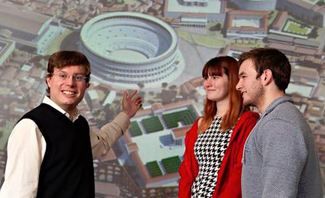Academic's digital Rome model wins prestigious teaching award
Release Date 28 February 2014

The University of Reading is delighted to announce that Dr Matthew Nicholls has won the 2014 Guardian Higher Education Award for Teaching Excellence for his Virtual Rome project.
Dr Nicholls' digital model of Rome (c. AD315) has allowed students to experience the ancient world first hand. This unique tool includes reconstructions of all the major monuments, including the Colosseum, bath houses, forum and markets as well as the many square miles of the ordinary housing, tombs, and commercial buildings.
University of Reading students are reaping the benefits of Virtual Rome from collaborating with Dr Nicholls in its development to learning about Ancient Rome in an engaging and innovative way.
Dr Nicholls received his award, which is sponsored by the Higher Education Academy, at a ceremony in London this week. He said:
"I'm absolutely delighted by this award, for myself and the students who have helped me develop my digital projects. I'm especially pleased to see my ancient subject of Classics, with great support from the University of Reading, recognised as a leader in innovative, modern teaching excellence. I look forward to publishing my model of Rome as a guide to the ancient city, and moving on to further digital teaching and research projects."
Dr Nicholls created the model by combining his research and teaching interests in the history and architecture of the ancient city with his computer modelling skills. The model, which can be used to generate images and animations of the ancient city from any angle and at any time of day or year, now forms a central part of the core teaching modules at the University of Reading's Classics Department.
Sir David Bell, Vice-Chancellor of the University of Reading, said: "Many congratulations to Matthew for this award. Virtual Rome epitomises Reading's teaching and learning ethos of inspiration and excellence. Students are taught by leaders in their field who are innovative and passionate about their subject. This means Reading continues to offer an outstanding education and the very best student experience."
Virtual Rome has been widely featured by the media including the BBC and Discovery channels. Dr Nicholls is now aiming to bring the model to an international audience which now is under contract for development as a book and package of digital resources for school and university teaching.
The success of Virtual Rome has led to a separate module designed and taught by Dr Nicholls on the digital modelling of ancient Roman Silchester. The module is envisaged as a long term and distinctive part of the classics curriculum at Reading, and its potential has been recognised by a £20,000 teaching and learning grant to allow the purchase of computer hardware and software, travel to events and time for project planning and content creation.
